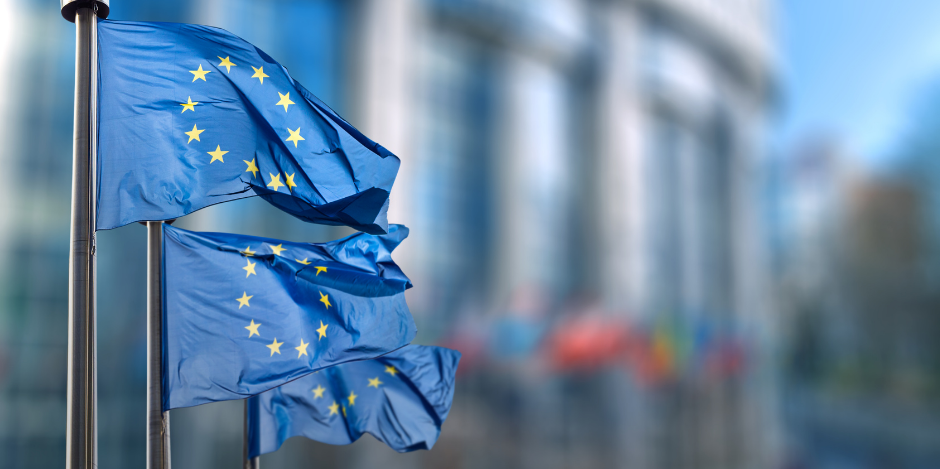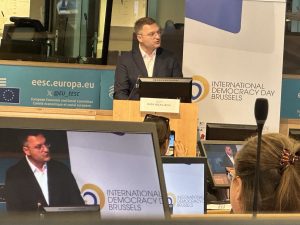CRTA keynote address at International Democracy Day Brussels
 Canva: European Economic and Social Commitee
Canva: European Economic and Social Commitee
Each year, Democracy Day reminds us of something simple, yet profound: democracy is never finished, never guaranteed, never secure.
We like to think of democracy as a permanent achievement, something written into constitutions and treaties. We used to declare “the end of history”, but history didn’t end, and democracy remains fragile.
Across the world, we see attempts to silence dissent, rewrite laws, hollow out institutions, and intimidate protest. But we also see something equally powerful: remarkable resilience, citizens who refuse to give up, who continue to speak, who march even when beaten down, who demand accountability even when the cost is high.
This is the story of my country, Serbia. But it is not only a Serbian story. It is part of a larger struggle for democracy in an age of insecurity.
In Serbia, today’s wave of protests began with tragedy. In November 2024, 16 lives were lost when the canopy of a newly renovated train station in Novi Sad collapsed. For citizens, it was immediately clear this was not only an accident but the result of corruption and negligence. Out of grief came determination: a demand for transparency, for responsibility, and for an end to impunity.
Since then, the scale of protest has been extraordinary. Over the past year, citizens, above all students, have sustained the longest wave of demonstrations in our modern history. Since February alone, CRTA has recorded more than 10,000 separate protests across more than 620 communities. These are not isolated events, but a nationwide movement for accountability and change.
Repression is never local
When governments respond to criticism with police batons, or brand their opponents “traitors” or “terrorists,” it is not just a national crisis, it is a universal warning. These tactics may have different accents, but they speak the same authoritarian language.
We in Serbia have seen police deployed as political enforcers. We have seen propaganda machines flood the public space with lies. We have seen laws reshaped to intimidate, not protect.
And I know this is not unique to us. Around the world, activists, journalists, and students face the same. Repression never stays within borders. It flows from Budapest to Belgrade, from Belgrade to Banja Luka, then Tbilisi, Minsk, Moscow, Beijing. The languages change, the uniforms change, but the message is the same: be silent, obey, forget your rights. And before long, the corrosion reaches the heart of Europe itself.
And sometimes, repression takes on extreme and shocking forms. During the largest protest in Serbia’s history, with more than 300,000 citizens gathered in Belgrade on March 15, people reported severe physical symptoms: chest pain, dizziness, hearing problems. Human rights organizations collected over 3,400 testimonies suggesting that an illegal sound cannon had been used against peaceful protesters, standing in silence, honoring victims. The government first denied, then admitted to owning such a weapon, but refused to acknowledge its use. The only “investigation” conducted was outsourced, astonishingly, to Russia’s FSB. The European Court of Human Rights had to issue an interim measure, recognizing the seriousness of the allegations, and prohibiting Serbia to use sonic weapons.
What is happening in Serbia today is not an isolated tragedy. It sends a signal to every authoritarian leader that violence enables control and fear sustains it. If that signal is left unchallenged, it will not stop at our borders. Repression travels faster than solidarity, unless we act.
The paradox of membership
Serbia is formally a candidate for European Union membership. That should mean commitment to democracy, accountability, and rule of law. Instead, what we see is the opposite: institutions turned into shells, independent voices silenced, citizens treated as enemies.
How can a country claim to aspire to join the European family while government officials burning the European flag? How can ministers declare loyalty to integration while celebrating policies of Moscow and Beijing? How can a president lead society towards EU while insulting EU officials as “scum” and calling authoritarian leaders “brothers”?
This paradox is not only about Serbia. It raises a deeper question for Europe itself: What does the EU stand for? Is membership only about technical compliance, ticking boxes, signing documents? Or is it about living the values that gave birth to the Union in the first place: peace, justice, democracy?
If Europe becomes comfortable with this contradiction, it risks losing not only its credibility abroad, but also its moral integrity at home. You cannot expand the Union by shrinking its values.
Europe must act
The EU was founded on the conviction that democracy and freedom are the foundations of peace. That conviction cannot stop at the Union’s borders. To defend democracy in candidate countries is not charity, it is self-preservation.
If the EU allows authoritarian practices to entrench themselves in states knocking at its door, it will import instability rather than export stability. It will invite insecurity rather than strengthen resilience.
Action is needed, not only declarations. Action means holding governments accountable for abuses. It means making clear that accession is not about convenience, but about genuine democratic reform. It means standing openly and without hesitation beside citizens who risk everything to defend their freedoms.
And let me be clear: those citizens are not a threat to stability. They are its foundation. Students marching in the streets, activists documenting abuses, journalists exposing corruption, they are the living proof that democratic aspiration is alive, even when governments betray it.
And the risks they face are real. Just few days ago, on national television, a senior official of the ruling party openly speculated that protesters would soon be killed. He named student Pavle Cicvarić, claiming he would be targeted as the “youngest among the blockade organizers.” The suggestion was chillingly clear: that the murder of a student activist might be staged and blamed on police in order to energize the movement. Imagine what this means for young people who take to the streets: not only beatings, not only arrests, but public threats of assassination made by ruling party officials.
They remind us that democracy is not handed down by institutions. It is built up by citizens who refuse to give up.
On the occasion of Democracy Day, let us remember: democracy is not an inheritance to be preserved in silence. It is a choice to be made, again and again, by each generation.
Repression anywhere is a warning everywhere. Candidate status without values is a hollow promise. Silence in the face of injustice is complicity.
But there is another side: citizens who resist, who insist that dignity matters, who believe that freedom is worth the cost. They are the true guardians of democracy.
If Europe stands with them, it not only defends Serbia’s democratic future, it defends its own. Because democracy cannot survive on treaties alone. It survives in solidarity, in courage, in action.
And that is what this moment calls for. Not complacency, not compromise, but courage. Courage to call things by their real name. Courage to defend principles even when it is difficult. Courage to act.
Because democracy is not optional. It is the only foundation for a stable, secure, and free Europe. Without it, peace is an illusion, and security is a lie.









